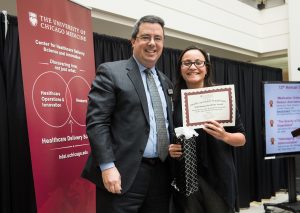By Natasha Pettit
With the help of the Center for Healthcare Delivery Science & Innovation’s Travel Grant Scholarship, I was able to attend the AAMC Integrating Quality earlier this month. This was a completely different type of conference than what I am used to, but in a good way. Previously, I have attended meetings and conferences for advancing my clinical skills, sharing and learning about research pertaining to my area of practice, infectious disease or for recruiting purposes at the national hospital-pharmacy meeting. However, this meeting focused on practice advancement and integrating quality into education and practice and offered quite a different spectrum of topics than compared to any conference that I have attended.
Hearing and seeing what others are doing to build quality improvement (QI) into medical resident/student training during the poster sessions was inspiring. I’ve realized that pharmacy needs to be part of the antimicrobial stewardship program (ASP) training since QI is very much a consistent part of what I (and all my pharmacy colleagues) do on a daily basis. I have begun thinking about how the pharmacy team might help with such an endeavor at UCM. We often have projects for our pharmacy residents

Dr. Weber & Natasha Pettit at the 12th Annual Quality and Safety Symposium at DCAM. (Photo by Jean Lachat)
that incorporate QI – perhaps there is some collaboration we could discuss with our pharmacy residency leadership for not only ASP but also other projects concentrating on safety/QI.
Learning about the QI initiatives at University of Utah Health was incredibly exciting. They are adding a dashboard tracking physician cost of care and other metrics, which has inspired me to start brainstorming on creating a UCM dashboard tracking antibiotic use/guideline congruent therapy/patient outcomes/etc. with the ASP. In fact, this is what Jennifer Pisano, MD and I have been discussing to do. Seeing it in a complete form at another health center was motivating. I’m looking forward to helping develop something like this at UCM.
The group discussions during conference brought up a lot of interesting points on the challenge to engage medical students and residents in quality initiatives. The folks in my group were of diverse backgrounds representing community hospitals and academic medical centers, and included individuals involved in planning medical resident training, practicing clinicians, and quality improvement administrators. We discussed how we can engage learners to participate in QI and I realized that it is a challenge from many angles. However, I think that some creative thinking like UCM’s “Room of Horrors” that Kathleen Wiest, a medical student from the University of Chicago presented on (she did a great job presenting by the way) was an incredibly innovative initiative. It was effective because:
- The entire healthcare team could participate.
- It was an active learning exercise (which means retention and true understanding of concepts covered and why it’s important).
- It was also set up so residents having varying schedules could still participate.
This fun and interactive project encouraged participants to become more comfortable and confident with asking questions (e.g. Is this foley needed? Is this antibiotic needed?), make sure guidelines are being followed, and possibly identify a potential QI initiative to change or implement new processes. Not all QI and safety initiatives can be simulations but rather we can develop some interactive modules online or via an app, which is something we’ve wanted to do with antibiotic prescribing.
I especially enjoyed the Keynote address by Robert M. Wachter, MD discussing how the uses of computers and EMRs have changed medical practice. Computers and MERS have certainly improved work flow but have also introduced new challenges (e.g. less personal interaction with members of healthcare team). As someone that performs my day-to-day review of patients using our Epic based module (built to my specifications to alert me to patients that need to be reviewed by ASP), I now can’t imagine life without an EMR given how much more efficient we have become. However, I never thought about how computers have changed how medicine is practiced and maybe not always for the better.
I got a ton out of attending the conference! So thank you HDSI for the Travel Grant Scholarship and giving me the opportunity to learn of new and innovative ways to change practice through quality initiatives.
